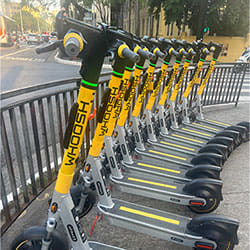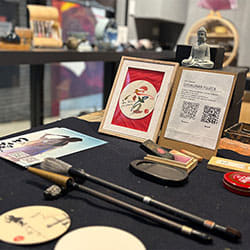It felt like something was wrong with my eyes, for some reason or other, it kind of seemed like the field of vision in my right eye had narrowed, and it was sort of hard to see. My eyesight has always been pretty bad, and 15 years have already passed since I first started wearing contact lenses.
It was the pandemic and for one reason or another I avoided going to hospital, but of course it was bothering me, so I did end up going to my ophthalmologist. I think at least a month had passed since I first started getting concerned about it.
I told my usual doctor about what was bothering me, and I got some drops in my eyes to open up the pupils before a fundus examination. The result: “We’d better have a specialist take a look at you, just to be sure.”
Then when I went to the specialist a week later, I was told “We’ll operate on you tomorrow.”
What!?! I was so taken by surprise, my head was full of questions like, “What should I do about such and such? And what about that?” What should I do about work, and cancelling my appointments?
The problem with my eye was that the retina had detached. A deficiency in my field of vision was making it feel like my field of vision had narrowed. It was as though a black curtain was obstructing my field of vision, and it just wouldn’t go away.
And before I knew it, it had gotten so bad that I needed surgery that day.
There was absolutely no pain at all, and on top of that, because your eyes try to see together, it was hard to notice how just one of my eyes was going.
A retina can detach no matter what age you are, but people with nearsightedness are at higher risk than people with good eyesight. It’s also linked to your genes and my mother too actually had laser treatment a few years ago.
It all happened so suddenly, and I had never thought that one day I would have surgery in America.
In any case, the patient after me was urgent, so my surgery was delayed a week.
I had to fast from midnight before the day of the surgery because I had a general anesthetic.
I was told to take a shower at night and in the morning. And I couldn’t put on anything like face lotion or cream after washing my face in the morning.
On the day of the surgery, I headed off to a big hospital about an hour away from home.
I completed the reception procedures after arriving, I was taken to a place like a waiting room, and then I moved to a private room.
I changed into a surgery gown, then had my temperature taken, urinalysis, and various kinds of eye drops because the surgery I was having was eye surgery.
They put a tube in the back of my right hand for giving me drugs, and they checked various details like the pharmacy I go to and my medical history.
A nurse had been looking after me up to that point, and then it was the turn of my doctor to come and check things, as well as the anesthetist and the surgeon doing the operation. The various people responsible for their various jobs always introduced themselves first, and as well as telling me the details of the surgery, they also asked me over and over, “Who is the person accompanying you?”
I thought it was interesting that even at a time like that people here in America would give me compliments, which I wrote about in my previous article “What I like about America” (https://kc-i.jp/en/activity/kwn/anderson_e/20161226/). It makes me smile.
I was grateful that at a time when I was full of anxiety and tension, they distracted me with casual conversation.
I am filled once again with gratitude and respect for the medical staff who looked after me. It is impressive how very courteous and supportive they were, even though they must have had a lot of difficult things to deal with every day. Everyone really was very nice and kind, their conversation was fun, and before I knew it, I felt as though I could relax.
But then when the moment came and I was wheeled to the operating theater on my bed, the tension hit extreme.
It was the sort of cold atmosphere you see on TV dramas, and the temperature was turned down. There were a lot of nurses, and here too they made sure to tell me their names before they did anything to me. A nurse held my hand, my face clearly stiff, and said to me, “It’s unsettling isn’t it, but it’ll be fine. That’s a promise!” They put the respirator mask on me, I took a few breaths, and I don’t remember anything after that.
A nurse woke me up calling me by my name, which was already 2 hours after I went under.
Anesthesia really is a wonder. I have no memory whatsoever of a whole 2 hours, and when I woke up the surgery was over.
I was feeling kind of groggy, my throat was pretty sore, maybe because of the anesthetic, and my voice was raspy.
The nurse brought me some cold apple juice, which tasted incredibly good to me, being my first fluids in 17 hours.
I was still unsteady on my feet, so they transferred me in a wheelchair, and I went straight home.
(I wonder, if it was in Japan, would most people have stayed overnight at the hospital?)
The next day, I went back to the hospital to see the doctor in charge of the surgery, and of course the pain and the discomfort made it tough for about 3 days afterward. Retinal detachment differs from person to person, the symptoms and its progress differ, and so do the surgical treatments. In my case, they attached a silicon band to the eyeball to hold down the detached part.
Well, that’s about it for this article about my experience with surgery in America.
(Note: The events I describe in this article took place at the end of last year.)
My eyesight gradually returned to normal several months after surgery. But the surgery has meant a further worsening of my eyesight. I am booked in for another checkup in May and if progress is good, I guess that will be it for the time being.
I guess this goes for any part of your body, but you realize for the first time how important health is, and how thankful you are for it, only after it has gone out of hand. I am quite nearsighted and I can’t improve my eyesight, but I know I must take really good care of it, so that it doesn’t get any worse.
I guess the pandemic has meant there are other people who felt as though they didn’t want to be a bother to healthcare workers and didn’t get help, or who felt afraid of going to hospital (because of the risk of infection). But, if you feel now as though something is not right, if you feel uneasy that things aren’t the way they normally are, please, I urge you not to put it off and to go to hospital. So that it’s not too late.
- 2022.04.15
- Surgery in America!?






























































